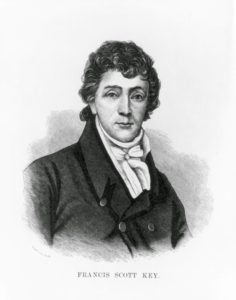Standing Up to the National Anthem
 This Nation’s anthem was composed by Francis Scott Key, a racist, white supremacist, anti-abolitionist lawyer. He felt that black people, free or slave, were genetically inferior to white people. That perception was the foundation of his legal pursuits. When he was the District Attorney for the City of Washington, he defended slavery and prosecuted those in the abolitionist movement. He argued in court that the institution of slavery should be continued, continued ad infinitum, I suppose, as there is no known cure for “genetic inferiority” that I am aware of. Actually, I never heard anyone but my white brothers use that particular terminology.
This Nation’s anthem was composed by Francis Scott Key, a racist, white supremacist, anti-abolitionist lawyer. He felt that black people, free or slave, were genetically inferior to white people. That perception was the foundation of his legal pursuits. When he was the District Attorney for the City of Washington, he defended slavery and prosecuted those in the abolitionist movement. He argued in court that the institution of slavery should be continued, continued ad infinitum, I suppose, as there is no known cure for “genetic inferiority” that I am aware of. Actually, I never heard anyone but my white brothers use that particular terminology.
But back to Francis, this anthem that he wrote, and this very demeaning obsession this nation has, that I, a black man, should stand respectfully and honor his musical creation. I suggest that anyone who takes umbrage at my statement, read the lyrics of the song, the whole song. Then dare ask a black person to stand for this anthem.
“No refuge could save the hireling and slave/ From the terror of flight or the gloom of the grave/ And the star-spangled banner in triumph doth wave/ O’er the land of the free and the home of the brave.”
Would Jewish people be expected to stand reverently for an anthem written by Heinrich Himmler or Joseph Goebbels or the rest in that Nazi crew? Should anyone be expected to endure the humiliation of honoring an anthem, authored by someone who felt they were less than human? Not in any just environment. Which also begs the question, exactly where are we
Ridicule, anger, suspicion, and confrontation are what people face, should they choose not to demonstrate visible deference to this disingenuous (at best) piece of sheet music. To expect black people to stand and honor this anthem is troubling on so many levels that it boggles the mind. It’s a shameful thing to stand for an anthem, which represents, in my opinion, a tacit acceptance of a clear insult or the pure ignorance – willful or otherwise – of its author, its history and tone.
I don’t want to get into the psychological ramifications of showing respect to a personal insult, hurtful but at least a contained experience. Truthfully, I look at white people who stand for the national anthem at a sporting event and wonder what’s on their minds. Are they following the crowd’s inertia, thinking only to finally get on with the game? Are they thinking military thoughts, nationalistic thoughts? I don’t know.

But to see black people standing and honoring this anthem sadly brings back familiar feelings, feelings I had while reading “The Invisible Man,” a book written by Ralph Ellison. He wrote about the dynamics between the slave and the enslaver, in a fairly self-explanatory phenomenon called the “Plantation Mentality.” Egregious or otherwise, the slave did what was pleasing to the master. If you need elaboration, read the book. It makes me sad and disappointed to see that this repugnant form of oppression is alive, slightly camouflaged and insidiously thriving.